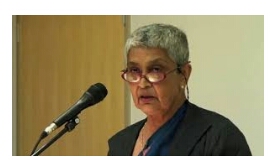Hello Readers!
This blog is about the views on feminism by showalter and Gayatri spivak. Click here to know more about Elaine showalter.
Elaine Showalter :
Elaine Showalter, American literary critic and teacher and founder of gynocritics. She developed the concept of "gynocritics" and practised it through her life career. She, beings a specialized in Victoria literature, wrote on Pre-Victorian, Victorian, and modern female writers observing their social, cultural, religious and financial status in their own periods. She is well known and respected in both academic and popular cultural fields.
Feminist Criticism : Elaine Showalter
Showalter is concerned by stereotypes of feminism that see feminist critics as being 'obsessed with phallus' and ' obsessed with destroying male artists'. Showalter wonders if such stereotypes emerged from the fact that feminism lacks a fully articulated theory.
In Toward a Feminist pietics Showalter divides feminist criticism into two sections :
Gayatri Chakravorty
Gayatri Chakravorty, Indian literary theorists, feminist critic, Postcolonial theorist, and professor of comparative literature noted for her personal brand of deconstructive criticism, which she called criticism, which she called "interventionist."
An extraordinary criticism of the dangers of trying to talk for those who have no voice in society. Why? Because it is extremely hard to truly understand what you have only heard about, and not experienced.
"Can the subaltern speek ?"
A Macat Analysis of Gayatri Chakravorty Spivak's "Can the Subaltern speak? " - one of the most important essays in the field of psychological studies ever written.
Postcolonialism is the study of the detritus of empire the after effects of the colonial era. It looks at the effects that colonialism had on colonised peoples.
Gayatri Chakravorty spivaka wrote her essay can the subaltern speak? In 1988 to survey the products of what was then a new academic study she wondered hoe well Postcolonialism had been able to understand and give voice to the colonised, especially the least powerful groups -those she calls "Subaltern". Her essay criticized much of the work done by mostly white, mostly male, western academics.
Thank you...
Feminist Criticism : Elaine Showalter
Showalter is concerned by stereotypes of feminism that see feminist critics as being 'obsessed with phallus' and ' obsessed with destroying male artists'. Showalter wonders if such stereotypes emerged from the fact that feminism lacks a fully articulated theory.
In Toward a Feminist pietics Showalter divides feminist criticism into two sections :
- The woman as Reader or feminist critique
- The woman as Writer or Gynocritics. Showalter traces the history of women's literature, suggesting that it can be divided into three phases :
- The Feminine phase(1840-1880):
- The Feminist phase (1880-1920)
- The Female phase 1920-)
Gayatri Chakravorty
Gayatri Chakravorty, Indian literary theorists, feminist critic, Postcolonial theorist, and professor of comparative literature noted for her personal brand of deconstructive criticism, which she called criticism, which she called "interventionist."
An extraordinary criticism of the dangers of trying to talk for those who have no voice in society. Why? Because it is extremely hard to truly understand what you have only heard about, and not experienced.
"Can the subaltern speek ?"
A Macat Analysis of Gayatri Chakravorty Spivak's "Can the Subaltern speak? " - one of the most important essays in the field of psychological studies ever written.
Postcolonialism is the study of the detritus of empire the after effects of the colonial era. It looks at the effects that colonialism had on colonised peoples.
Gayatri Chakravorty spivaka wrote her essay can the subaltern speak? In 1988 to survey the products of what was then a new academic study she wondered hoe well Postcolonialism had been able to understand and give voice to the colonised, especially the least powerful groups -those she calls "Subaltern". Her essay criticized much of the work done by mostly white, mostly male, western academics.
Thank you...



No comments:
Post a Comment